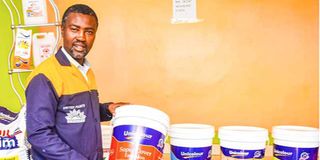
Stephen Moche, one of the directors of United Paints, at their production plant in Njiru on Kangundo Road. The company started as a small hardware in Kariobangi before transitioning into a paint manufacturer.
When George Gichuki started a small hardware store in Kariobangi in 1997, he couldn't have imagined that 27 years later it would have grown into a major paint manufacturer supplying products across the country.
While running the hardware store, Mr Gichuki would receive orders from customers for different shades of paint, which he would produce by mixing different components in a bucket with sticks.
This old-fashioned way of doing things was quite tedious, but it was not an exercise in futility, as it taught the entrepreneur everything he needed to know about making and selling paint products.
“The business had a very humble beginning, but has over the years grown to a point where we supply all the categories of paints needed to decorate a home,” said Stephen Moche, one of the directors of United Paints, in an interview with Powering SMEs.
As the business continued to grow, Mr Gichuki moved production activity from Kariobangi to a larger space in Njiru, where he installed modern equipment and brought in more professionals to help take the business to the next level.
With the aid of tinting machines from China, they started producing a new line of premium paints called unicolor, which allowed them to compete in the same space as some of the big players in the market.
High quality
“Many of the clients we interacted with were telling us they couldn’t use certain paints because they perceived them to be for the high end. Meanwhile, the ‘high end’ who used these paints needed an alternative that was high quality but affordable,” said Mr Moche.
Following the launch of its premium 'unicolor' products, the company began to gain national recognition and was voted the most affordable quality brand in 2021.
From one employee, the company, which currently employs more than 100 people, hopes to soon relocate to Kamulu where they have established another factory to expand their production capacity.
“We have ambitious plans to grow further into serving the larger East African market, where we will be able to take advantage of the expanding construction industry,” said Mr Moche.
Most of the business is B2B, which means that they sell directly to hardware shops, which they equip with tinting machines so that they can deliver any colour a customer wants on the spot.
To penetrate the market effectively, the company also works closely with painters, involving them in various forums when they launch new products or when new colour trends emerge.
They also train painters on how to use paint effectively or how to match colours to create certain feelings, knowing that their business can only grow if painters are able to add value to their customers.
“Our industry is highly influenced by the painters. These are the people who have a lot of influence on the products that the developer will use for the housing, so we have to stay in touch with them,” explained Mr Moche.
They recently launched a campaign called 'changamkia unicolor, pata helaa' to win over the painters. Once someone buys the paint and uses it, they find a token inside that they can scratch and send to a USSD code to redeem as cash.
The company also uses popular social media platforms such as TikTok, Facebook and WhatsApp to communicate with customers, transact business and manage training.
“Marketing has completely changed and it continues to do so every other day, so depending on the clientele that we are facing, we do both the top line and below the line marketing to engage with our customers,” said Mr Moche.
Stephen says that over the past few years, the value chain has faced significant challenges that have affected the way they operate.
For example, as many of their products are sold to some of the government institutions, the issue of outstanding invoices has affected their cash flow.
Similarly, as they import a number of their raw materials, the fluctuation of the Kenyan shilling against the dollar has also affected their operations.
“Just the other day, the dollar hit the Sh160 exchange rate and you still have to import products, so what happens then and you still want to sell your products at a competitive price? It is a very delicate balancing act,” explained Mr Moche.
He says more needs to be done to support local manufacturers to produce goods locally, sell some locally and then export the rest because as a net importer, the country spends a lot of money importing products that can be produced locally.
“Titanium, which is a component used widely in the paints industry, is mined in large quantities in Kwale, but what are we doing to that raw titanium to be able to produce these other products? We need to start thinking about how to do value addition,” Mr Moche said.
As a way of giving back to the community, the company runs a number of community programmes, including supporting a children's home and mentoring young people to paint and become self-sufficient.
They also work with higher education institutions such as the University of Embu, which sends its students on internships to learn what it takes to run a business and how to put their knowledge into practice.
“Success comes down to how you apply your knowledge creatively. In fact, here we have employed a number of people on the basis of them having come up with brilliant solutions to a problem,” said Mr Moche.
His advice to anyone wanting to run a business is to base it on integrity, because people talk and if your reputation is damaged, it can be very difficult to recover.
“If you want to run a private entity, you have to make sure you are doing the right things otherwise you will not go far. Your word must mean something; don’t just give your word for the sake of it. When you say you are going to do something, make sure that you deliver,” said Mr Moche.






